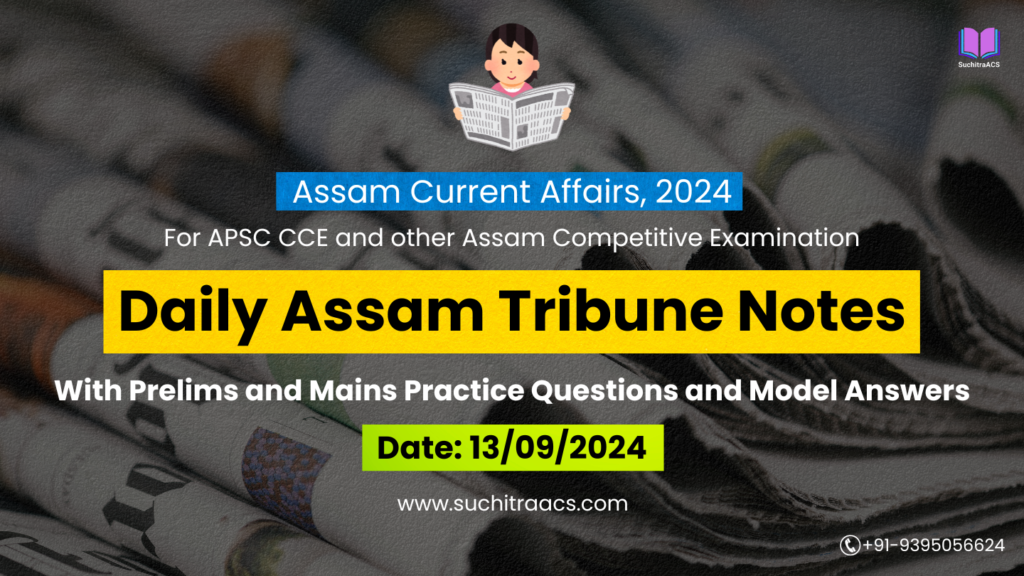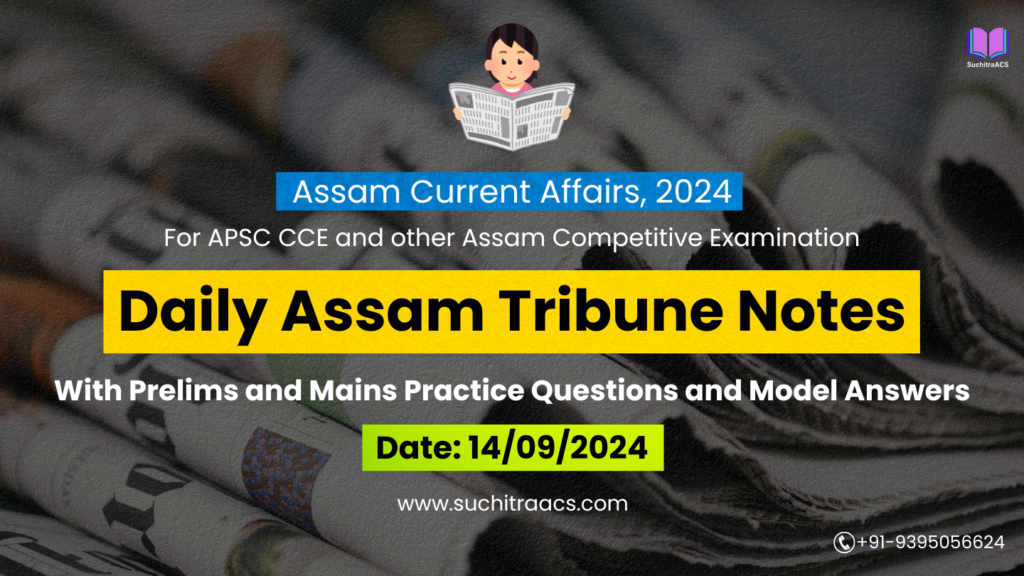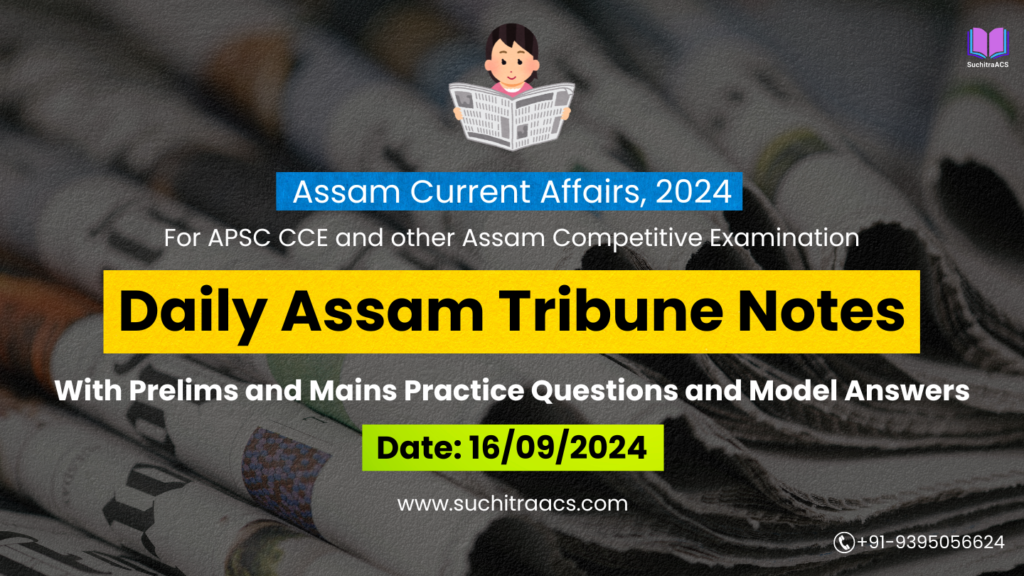APSC Current Affairs: Assam Tribune Notes with MCQs and Answer Writing (15/10/2024)
For APSC CCE and other Assam Competitive examinations aspirants, staying updated with current affairs is vital. This blog covers most important topics from the Assam Tribune today (15-10-2024). These issues are key for both APSC Prelims and Mains preparation, offering insights into the APSC CCE Syllabus.
1. India’s Decision to Withdraw Diplomats from Canada
- GS Paper II – International Relations
- Introduction: In a significant diplomatic move, India has decided to withdraw its High Commissioner and other diplomats from Canada following escalating tensions between the two countries over allegations and security concerns.
- Key Points:
- Diplomatic Withdrawal: The Ministry of External Affairs (MEA) announced the withdrawal of diplomats, citing the unsafe atmosphere for Indian officials in Canada.
- Allegations by Canada: Canada had attempted to link Indian officials to a probe into the killing of Khalistani separatist Hardeep Singh Nijjar, leading to strained bilateral ties.
- Government’s Stand: India termed the allegations as “baseless” and emphasized the need for Canada’s cooperation in ensuring the safety of Indian diplomats.
- Prelims Focus:
- Role of the High Commissioner: Understanding the functions and duties of a High Commissioner in bilateral relations.
- Khalistani Movement: A brief overview of the separatist movement and its impact on India-Canada relations.
- Mains Focus:
- Diplomatic Relations: Analyze the recent developments between India and Canada, and their impact on trade, cultural ties, and regional geopolitics.
- Security of Diplomats: Discuss the challenges in ensuring the safety of diplomatic missions abroad amidst rising global tensions.
- Role of the MEA: Examine how India’s Ministry of External Affairs manages international disputes and maintains diplomatic balance.
- Conclusion: India’s withdrawal of diplomats marks a critical point in its relations with Canada. While diplomatic measures aim to safeguard national interests, ongoing dialogue and cooperation are essential for stabilizing bilateral ties.
2. Manipur Peace Talks Initiated by the Union Government
- GS Paper III – Security, Internal Security
- Introduction: In an effort to resolve the 17-month-long unrest in Manipur, the Union Home Ministry initiated peace talks between representatives of the Kuki, Meitei, and Naga communities in New Delhi.
- Key Points:
- Objective: The talks aimed to bring together the communities involved in the violent conflict since May 2023.
- Participation: Representatives from different community groups and Manipur legislators attended the meeting, marking the first such dialogue in the national capital.
- Security Concerns: Over 220 civilians have lost their lives and around 65,000 have been displaced due to the ongoing conflict.
- Prelims Focus:
- Ethnic Groups in Manipur: Overview of the Kuki, Meitei, and Naga communities and their historical grievances.
- Role of the Union Home Ministry: Understanding the ministry’s role in mediating peace and maintaining law and order.
- Mains Focus:
- Ethnic Conflicts in the Northeast: Analyze the root causes of the prolonged ethnic conflict in Manipur and its socio-political implications.
- Peacebuilding Measures: Evaluate the role of central and state governments in facilitating peace and the challenges involved.
- Long-term Solutions: Suggest measures for achieving sustainable peace and ensuring the rehabilitation of displaced populations.
- Conclusion: The initiation of peace talks between the warring communities in Manipur is a significant step toward reconciliation. However, the success of these efforts will depend on continuous dialogue and addressing the underlying causes of unrest.
3. Nobel Memorial Prize in Economics 2024
- GS Paper III – Economic Development
- Introduction: The Nobel Memorial Prize in Economics was awarded to Daron Acemoglu, Simon Johnson, and James A. Robinson for their research on the role of societal institutions in economic growth.
- Key Points:
- Research Focus: Their work highlights how strong institutional frameworks contribute to a country’s prosperity, while poor institutions can hinder growth.
- Key Findings: The research suggests that democratic institutions, property rights, and rule of law are critical for sustainable economic development.
- Global Relevance: The study provides insights into why certain countries fail to achieve long-term growth despite favorable geographical conditions.
- Prelims Focus:
- Nobel Memorial Prize in Economics: Understanding the criteria and significance of the prize.
- Concepts of Property Rights and Rule of Law: Key economic principles discussed in the research.
- Mains Focus:
- Institutional Economics: Analyze how strong institutions can impact a country’s economic growth and development.
- Comparative Analysis: Compare the economic trajectories of countries with robust institutions versus those with weaker governance structures.
- India’s Institutional Framework: Discuss how India can strengthen its institutions to achieve sustainable growth.
- Conclusion: The Nobel-winning research underscores the importance of governance and institutional strength in economic development. It serves as a reminder for countries to focus on building inclusive and transparent institutions to drive long-term growth.
4. Assam’s Push for Organic Farming in Tea Estates
GS Paper III – Agriculture, Environment
Introduction:
The Assam Government has launched an initiative to promote organic farming in tea estates across the state. This effort aims to transition some of Assam’s tea production from conventional to organic methods, responding to global demand for sustainable and eco-friendly agricultural practices.
Key Points:
- Organic Tea Production:
- Organic farming methods avoid the use of chemical fertilizers and pesticides, focusing instead on natural alternatives like bio-fertilizers.
- This shift aims to improve soil health, protect the environment, and cater to international markets that demand organic products.
- Support for Tea Estates:
- The state government is providing subsidies and technical support to tea estates willing to adopt organic farming practices.
- It also includes training programs for tea growers to understand organic farming techniques.
- Market Potential:
- Organic Assam tea has a niche market globally, particularly in Europe and North America, where consumers prefer chemical-free products.
- Organic certification is being facilitated to ensure that the produce meets international standards.
Prelims Focus:
- Organic Certification Process: Understanding how tea estates obtain certification for organic produce.
- Bio-fertilizers: What they are and their role in organic farming.
Mains Focus:
- Benefits of Organic Farming: Discuss how organic farming practices contribute to sustainability, soil health, and environmental conservation.
- Challenges in Transitioning to Organic Farming: High initial costs, certification challenges, and the time required for transitioning from conventional to organic.
- Global Market Dynamics: Analyze the potential of Assam’s organic tea in the global market and strategies to enhance its competitiveness.
Conclusion:
Promoting organic farming in Assam’s tea estates is a strategic move that aligns with global trends towards sustainability. While challenges exist, the initiative has the potential to boost the state’s tea industry and strengthen its position in international markets.
5. Flood Management Projects in Barak Valley
GS Paper III – Disaster Management, Environment
Introduction:
In response to recurrent floods in the Barak Valley, the Assam Government has launched new flood management projects. These projects aim to protect life and property in flood-prone districts like Cachar, Karimganj, and Hailakandi.
Key Points:
- Infrastructure Development:
- The projects include the construction of embankments, river channelization, and the installation of early warning systems.
- Dredging operations are being carried out to deepen the riverbeds and increase their water-carrying capacity.
- Community-Based Disaster Management:
- Local communities are being trained in flood preparedness and response activities, such as evacuation procedures and emergency resource management.
- Partnerships with Central Agencies:
- The state government is collaborating with the National Disaster Management Authority (NDMA) and the Central Water Commission (CWC) to ensure the success of these projects.
Prelims Focus:
- Barak Valley: Geographic location and districts included.
- Dredging: Its role in flood management.
Mains Focus:
- Challenges in Flood Management: Discuss issues such as maintenance of embankments, encroachments, and funding constraints.
- Impact of Floods on Agriculture: How floods affect agricultural productivity and livelihoods in the Barak Valley.
- Strategies for Effective Flood Management: Explore the role of technology and community participation in building flood resilience.
Conclusion:
The new flood management projects in the Barak Valley are crucial for reducing the impact of recurrent floods. Effective implementation and community involvement will be key to ensuring long-term resilience against flooding in the region.
6. Assam Cabinet’s Approval of the State Education Policy
GS Paper II – Education, Governance
Introduction:
The Assam Cabinet has approved the new State Education Policy (SEP), aligning it with the National Education Policy (NEP) 2020. The policy aims to reform the education system, emphasizing skill development, digital literacy, and inclusive education.
Key Points:
- Key Features of the Policy:
- The SEP emphasizes vocational education, aiming to equip students with industry-relevant skills from the secondary level.
- It also focuses on the digitization of classrooms to enhance digital learning opportunities across the state.
- Inclusion of Regional Languages:
- The policy mandates the teaching of Assamese and other regional languages in schools to preserve the cultural heritage.
- Focus on Teachers’ Training:
- A special emphasis is placed on teacher training programs to ensure that educators are equipped to implement the new methodologies and technology in classrooms.
Prelims Focus:
- National Education Policy (NEP) 2020: Key highlights and how the SEP aligns with it.
- Importance of vocational education in the school curriculum.
Mains Focus:
- Reforms in Education: Discuss the potential of the new State Education Policy in transforming Assam’s education system.
- Challenges in Implementation: Issues like teacher shortages, funding, and infrastructure constraints that could hinder the policy’s success.
- Inclusive Education: The role of policies in ensuring access to quality education for all, especially in rural and marginalized communities.
Conclusion:
The State Education Policy marks a significant step towards modernizing Assam’s education system. It seeks to balance traditional values with modern skills, preparing students for a future that is increasingly driven by technology and innovation.
APSC Prelims Practice Questions
1. What is the primary goal of Assam’s initiative to promote organic farming in tea estates?
(a) To increase the use of chemical fertilizers for higher yields
(b) To reduce the international market competition for Assam tea
(c) To cater to global demand for sustainable and eco-friendly tea products
(d) To convert all tea estates into small-scale farms
Answer: (c) To cater to global demand for sustainable and eco-friendly tea products
Explanation:
The initiative to promote organic farming in Assam’s tea estates is aimed at transitioning some of the production to meet the global demand for sustainable and eco-friendly agricultural products. This is part of Assam’s strategy to tap into niche international markets that prefer organic tea.
2. Which of the following agencies is involved in the flood management projects in Assam’s Barak Valley?
(a) Indian Meteorological Department (IMD)
(b) Central Water Commission (CWC)
(c) National Green Tribunal (NGT)
(d) NITI Aayog
Answer: (b) Central Water Commission (CWC)
Explanation:
The Central Water Commission (CWC), along with the National Disaster Management Authority (NDMA), is collaborating with the Assam Government to implement flood management projects in the Barak Valley. The projects aim to reduce the impact of recurrent flooding in the region.
3. In which of the following districts are the new flood management projects being implemented in Assam’s Barak Valley?
(a) Tinsukia, Dibrugarh, Jorhat
(b) Cachar, Karimganj, Hailakandi
(c) Kamrup, Nalbari, Baksa
(d) Sonitpur, Lakhimpur, Dhemaji
Answer: (b) Cachar, Karimganj, Hailakandi
Explanation:
The flood management projects in Assam are focused on the Barak Valley, specifically targeting the districts of Cachar, Karimganj, and Hailakandi to mitigate the impact of recurring floods.
4. What is a major feature of the Assam State Education Policy (SEP) that aligns with the National Education Policy (NEP) 2020?
(a) Complete removal of regional languages from the curriculum
(b) Emphasis on traditional teaching methods only
(c) Focus on vocational education and skill development
(d) Centralization of education system in Assam
Answer: (c) Focus on vocational education and skill development
Explanation:
The Assam State Education Policy (SEP) emphasizes vocational education and skill development to align with the National Education Policy (NEP) 2020. This aims to equip students with industry-relevant skills from the secondary level onwards.
5. Which community groups were involved in the peace talks initiated by the Union Government to address the conflict in Manipur?
(a) Meitei, Kuki, Naga
(b) Ahom, Bodo, Rabha
(c) Mizo, Chakma, Tripuri
(d) Garo, Khasi, Jaintia
Answer: (a) Meitei, Kuki, Naga
Explanation:
The Union Government initiated peace talks involving the Meitei, Kuki, and Naga communities to address the ongoing conflict in Manipur. The talks aim to bring stability and peace to the region by fostering dialogue among the different groups.
6. Which of the following was a key decision taken by India in response to diplomatic tensions with Canada in October 2024?
(a) Imposing trade sanctions on Canadian goods
(b) Closing its consulate in Toronto
(c) Withdrawing its High Commissioner and diplomats from Canada
(d) Suspending air travel between India and Canada
Answer: (c) Withdrawing its High Commissioner and diplomats from Canada
Explanation:
In response to diplomatic tensions and allegations from Canada, India decided to withdraw its High Commissioner and diplomats to ensure their safety amidst the rising tensions between the two countries.
7. What is the monthly pension provided under the Literary Pension Scheme in Assam for the year 2024-2025?
(a) ₹5,000
(b) ₹8,000
(c) ₹10,000
(d) ₹12,000
Answer: (b) ₹8,000
Explanation:
The Literary Pension Scheme in Assam provides a monthly pension of ₹8,000 to senior writers who have made notable contributions to Assamese literature. This initiative aims to support and recognize their work.
APSC Mains Practice Question
Question:
Examine the role of Assam’s State Education Policy (SEP) in transforming the state’s education system. How does it align with the objectives of the National Education Policy (NEP) 2020, and what are the challenges and opportunities in its implementation?
(Answer in 250 words)
Model Answer:
Introduction:
The Assam State Education Policy (SEP) aims to modernize the state’s education system by aligning with the principles of the National Education Policy (NEP) 2020. It emphasizes skill development, digital literacy, and the promotion of regional languages to create a balanced educational environment.
Role of Assam’s SEP in Transforming Education:
- Focus on Vocational Training: The SEP prioritizes vocational education from the secondary level, equipping students with industry-relevant skills that prepare them for the job market.
- Digitization of Education: By promoting the digitization of classrooms, the policy seeks to bridge the digital divide, especially in rural areas, and improve access to modern learning tools.
- Inclusive Education: The policy ensures the inclusion of regional languages like Assamese in the curriculum, thereby preserving cultural heritage while offering a well-rounded education.
Alignment with NEP 2020:
- Skill Development: Both the NEP 2020 and Assam’s SEP emphasize the importance of skill-based learning to make students employable in a dynamic economy.
- Holistic Learning: The focus on multilingual education and technology integration aligns Assam’s SEP with the broader vision of the NEP 2020 for holistic student development.
Challenges:
- Infrastructure Gaps: Implementing digital classrooms requires significant infrastructure investment, especially in remote areas.
- Teacher Training: Adequate training for teachers to adopt new teaching methods and technology is a critical challenge.
Opportunities:
- Enhanced Employability: The emphasis on vocational education can reduce unemployment by creating a skilled workforce.
- Promotion of Regional Culture: By including regional languages, the SEP supports cultural preservation alongside modern education.
Conclusion:
The Assam State Education Policy represents a forward-looking approach to transforming the education system, in line with the NEP 2020. Addressing challenges like infrastructure gaps and teacher training will be crucial for its successful implementation, enabling Assam to achieve an inclusive and modern education system.
✨ Looking for top-quality APSC online coaching at an affordable price?

🔔 Join Our WhatsApp Study Group!
For exclusive access to premium quality content, including study materials, current affairs, MCQs, and model answers for APSC CCE and other Assam competitive exams.
Click here to join: SuchitraACS Study WhatsApp Group
📚 Want to know more about SuchitraACS’s most affordable courses?
Click here to know more: SuchitraACS Courses for APSC CCE and Assam Competitive Examinations




